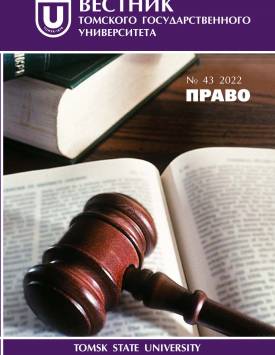Constitutionalization of criminal law: the problem of defining the object and subject of the legal process
The constitutionalization of criminal law is a complex and multi-level process of translating constitutional ideas and values into criminal law and the practice of its application. This is a controlled and directed process, which, from the point of view of its structural and functional analysis, presupposes the presence of a well-defined object of influence and subjects of constitutionalization. The object-subject characteristic of the constitutionalization of criminal law in branch science has not been studied. In the article, the author solves this urgent problem based on the application of a systematic approach within the framework of the implementation of the requirements of structural and functional analysis. The constitutionalization of criminal law is understood in this work as a process of substantive concretization of constitutional principles and standards in the practice of criminal law regulation. Proceeding from the fact that such regulation is an organic unity of the law and the practice of its application, the author, nevertheless, argues that the phenomenon of criminal law practice itself, as an element of the object of constitutionalization of criminal law, should be limited, excluding from its scope institutional and procedural characteristics of the practice, and leaving only its results in the form of the content, interpretation and meaning of the criminal law norms created by the parliament and applied by the court in a particular case. As a result, it is concluded that the object of constitutionalization in criminal law is precisely the criminal law norms expressed in the sources of law, which are given a particular interpretation in the process of law enforcement. When analyzing the subjects of the constitutionalization of criminal law, there is widespread opinion in science that this is exclusively the Constitutional Court of Russia is critically assessed. It is proved that, in addition to it, the subjects of constitutionalization are: parliament and courts of general jurisdiction. This made it possible to classify the subjects of constitutionalization, depending on the moment at which criminal regulation they are connected to ensure its constitutionality. “Primary” subjects of constitutionalization (parliament and court of general jurisdiction) carry out perspective constitutionalization, using constitutional principles and norms to regulate public relations, creating and applying criminal law norms. The Constitutional Court of the Russian Federation is empowered to carry out retrospective constitutionalization of the already declared legal matter through constitutional justice, which makes it possible to recognize it as a "secondary" subject of the constitutionalization of criminal law. The author declares no conflicts of interests.
Keywords
constitutionalization of criminal law,
restriction of human rights and freedoms,
measures of a criminal-legal nature,
criminal penalty,
legal consequences of committing a crime,
crime prevention measuresAuthors
| Guzeeva Olga S. | Arbitration Court of the Moscow Region | olga3520@list.ru |
Всего: 1
References
Barak A. The Constitutionalization of the Israeli Legal System as a Result of the Basic Laws and its Effect on Procedural and Substantive Criminal Law // Israel Law Review. 1997. № 31 (1-3). Р. 3-23. doi: 10.1017/S0021223700015223
Bilionis L.D. Process, the Constitution, and Substantive Criminal Law // Michigan Law Review. 1998. Vol. 96, № 5. Р. 1269-1334. doi: 10.2307/1290179
Brownstein A. The Constitutionalization of Self-Defense in Tort and Criminal Law, Grammatically-Correct Originalism, and OtherSecond Amendment Musings // Hastings Law Journal. 2009. Vol. 60, Is. 6. Р. 1205.
Cedras J. La constitutionnalisation de la procedure penale en France et aux Etats-Unis // Revue international de droit penal. 2011. № 82 (3). Р. 445-456. doi: 10.3917/ridp. 823.0445
Dubber M.D. Criminal Justice in America: Constitutionalization Without Foundation (March 16, 2012). URL: https://ssrn.com/abstradA2024942 (available at 20.01.2020).
Merita Kettunen Legitimizing European Criminal Law. Springer International Publishing, 2020. Р. XIII, 278.
Philip L. La Constitutionnalisation du droit penal franjais // Revue de science criminelle et de droit penal compare. 1985. № 4. Р. 711-723.
Lazerges Ch. La question prioritaire de constitutionnalite devant le Conseil constitu-tionnel en droit penal: entre audace et prudence // Dans Revue de science criminelle et de droit penal compare. 2011. № 1. Р. 193-207.
Singelnstein T. Zur Konstitutionalisierung im Strafrecht // Annales de la Faculte de Droit d’Istanbul. 2011. Vol. XLIII, № 60. Р. 33-45.
Крусс В.И. Конституционализация права: основы теории. М. : Норма-Инфра-М, 2017. 239 с.
Шупицкая О.Н. Конституционализация права и правовая система // Юридический вестник ДГУ. 2018. Т. 28, № 4. С. 105-113.
Кайсин Д.В. Источники уголовно-правовой системы Российской Федерации: дис.. канд. юрид. наук. М., 2005. 184 с.
Копшева К.О. Уголовное законодательство Российской Федерации и его основания (теоретический аспект). Саратов: Саратов. гос. академия права, 2007. 168 с.
Ображиев К.В. Система формальных (юридических) источников Российского уголовного права. М.: Юрлитинформ, 2015. 502 с.
Пудовочкин Ю.Е. Источники уголовного права Российской Федерации // Журнал российского права. 2003. № 5. С. 64-75.
Кузьмин А.Г. Конституционализация правосудия и арбитражная судебная практика в Российской Федерации: автореф. дис.. д-ра юрид. наук. Екатеринбург, 2016. 57 с.
Ульянов А.Ю. Конституционализация института прокуратуры как закономерный этап развития российской государственности // Вестник Томского государственного университета. Право. 2016. № 3 (21). С. 90-99.
Козырева Л.Г. Влияние правовых позиций Конституционного Суда на правоприменительную практику в экономической сфере // Вестник Конституционного Суда Республики Беларусь. 2012. № 3. С. 82-87.
Синицына А.М. Роль Конституционного Суда Республики Беларусь в обеспечении конституционализации нормотворчества и правоприменения // Вестник Полоцкого Государственного Университета. Серия D. Экономические и юридические науки. 2018. № 6. С. 202-206.
Крусс В.И. Понятие, актуальность и формы конституционализации права // Вестник ТвГУ. Серия: Право. 20і2. № 31. С. 104-119.
Головко Л.В. Конституционализация российского уголовного процесса: между лозунгами и реальностью // Государство и право. 2013. № 12. С. 83-94.
Елинский А.В. Некоторые направления конституционализации российского уголовного законодательства с точки зрения разработки проекта нового Уголовного кодекса // Юридический мир. 2012. № 4 (184). С. 35-38.
Никитина А.В. Понятие и виды конституционных дефектов // Актуальные вопросы юридических наук : материалы III Междунар. науч. конф. (г. Чита, апрель 2017 г.). Чита : Молодой ученый, 2017. С. 40-45.
Кукушкин А.А. Правовая позиция Конституционного Суда РФ: сущность, юридические признаки и процессуальные формы // Актуальные проблемы Российского права. 2009. № 1. С. 96-102.

